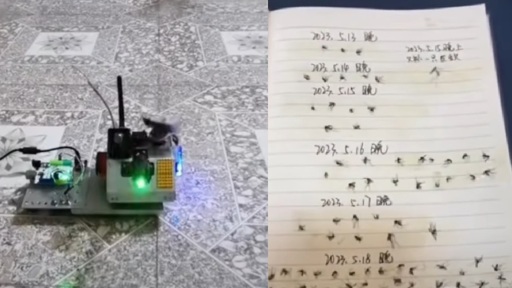Something like this:
Viral video shows ‘radar air defense system’ claimed to shoot mosquitos with lasers
deleted by creator
Would they be dangerous to mount them on sharks ? asking for a friend.
7 years in evil medical school and all you get are some crummy sea bass…
You need more capital. One
million… billion dollars oughta do it.
Build it in a fire-brick tunnel enclosure, with slow release CO2 , or IR light attractant.
The Gates Foundation has something like this 20 years ago. It used the sounds of wing beats to find and identify gender and species.
It is unclear why nothing came of it. I look it up every few years…
Probably haven’t solved the issue of friendly fire, i.e. potentially blinding users.
It used a micropulse of IR laser. Your eye couldn’t see it, nor focus it properly. However, it had just enough power to overheat and damage the mosquito wings.
I believe the issue was with the targeting. It could don’t, but not cheap enough for the mass deployment they intended. Mosquito nets were far more effective, once cost was accounted for.
Doesn’t matter if it’s visible or not- any laser capable of delivering enough energy to kill or otherwise disable a mosquito will harm your eyes.
Most of the problem with lasers come from focusing them. The eye is incredibly good at it. This means even a small laser pen can reach MW/m^2 ranges by the time it hits the retina.
IR is a different story (at longer wavelengths). Without the ability to see it, our eye will not attempt to focus on it. Also, our eyes lenses are not particularly transparent to it. 3rd, the ultra short pulses mean that there is no time to focus.
As for the mosquito, the laser is tuned to a frequency that is strongly absorbed by their wings. Given their size and how delicate their wings are, a tiny amount of energy can cause significant damage. Conversely, the same energy on our eye will just cause a slight amount of heating. The bulk mass of the eye will absorb this fine, with no damage
See the linked article elsewhere in this post, they had to wear safety goggles around it when it was in use.
A laser strong enough to shoot a mosquito down will also be strong enough to cause instant permanent blindness. Would you really want to be in the same room as that thing?
As long as I’m not looking at it I’d feel more comfortable with it that being surrounded by mosquitoes. Would you rather be surrounded by mosquitoes than be in the same room as that thing?
Just buy a mosquito net and an Off® candle like the rest of us do.
Yes, if it’s strong enough to instantly kill a mosquito with a pulse it is likely that looking at the spot can blind you.
Forget lasers, you can also shoot them with a bit of salt. But I still need a tracking system. How does that even work with such a tiny insect?
The real story is how easy it is for bullshit to go viral.
Yeah, I have my doubts. Cool in concept, but getting a radar that is that sensitive and able to track quick movements seems difficult.
It looks like it’s just using an SR04 ultrasonic sensor too which isn’t even that precise.
The Robot I Made That Shines a Laser in Your Eye
(I’m not that guy)
Yes
Doubt anything like that id available for sale. He took the radar from a car, probably needed some serious tweaking to get it to track smaller objects and ignore larger ones.
If you have any military connections, get your hands on a AN/APG-81 from an F-35 and cook all the mosquitos in the room. Get any pets or food out first, of course.
I don’t doubt a laser could fry a mosquito; but could a mosquito actually be seen on radar? I would think LIDAR would be better at detecting such a small thing, and even then…
As long as the wavelength is adequate, you can track anything.
Astronomers track centimeter-sized objects up in space. Tracking a mosquito in the same room is not an issue. The rest of the “invention” is the problem.
No they don’t. Our greatest success to date was predicting a 1m wide asteroid a whole 3 hours before it hit.
That’s actually impressive given the challenge at hand. But nobody is tracking centimeter sized objects outside Earths orbit. And the ones they are tracking in orbit are man made trash and not rocks.
Yeah, they do. 8700 objects tracked that are 10cm or larger at the time of writing the paper. Shitloads of other debris that wasn’t regularly tracked, but could be, at 1cm or similar sizes. Source
Edit: I also never said “outside Earths orbit”, I said “in space”
That’s 10 times bigger than what you said originally.
I said “centimeter sized”, mr Pedant, which is 1cm. Which is possible to track, just not done. The point is if they can track that, they can track a mosquito in the same room. But by all means, keep arguing semantics.
Astronomers track centimeter-sized objects up in space
No they don’t
Which is possible to track, just not done.
I rest my case. Precision is important in astronomy.
Bruh, you want to be precise, read the fucking source. 1cm objects are tracked. Just not “routinely”. Stop being an annoying redditor. We are talking about capabilities and we are capable of doing that.
So take your rested case and stick it.
I mean we track the moon, and it can be measured in cm, right? /s
You likely can’t. The reason being the patents for the technology are owned by patent trolls who refuse to let them be used.
Source?
Pulled it out of their ass. There aren’t patents for mosquito lasers or what have you. The idea is just moronic. It is a fun engineering challenge but ultimately doesn’t transfer to the real world. You cannot scale it. It is dangerous. It is expensive to keep running / maintained. It has a direct competitor that works 100x better in the form of pesticide / poisons. Also a mosquito net works wonders, is scalable, cheap and efficient.
The technology has existed for well over a decade now.
You cannot scale it. It is dangerous. It is expensive to keep running / maintained.
Your source:
for the demonstration, I had to wear protective goggles since that type of laser is not safe for your eyes; And no one has yet worked out how to make the device cheap enough to be useful in the places it is most needed, places where most people’s mosquito-defense system consists of sleeping under nets every night.
You were saying?
But despite Myhrvold’s enthusiasm, the Photonic Fence hasn’t been all that easy to actually build. It’s taken years of development to figure out how to continuously track and identify a specific type of insect and then dispatch it safely and efficiently. For instance, for the demonstration, I had to wear protective goggles since that type of laser is not safe for your eyes; I was assured that when it’s market-ready, the laser they deploy will not potentially blind human passersby. And no one has yet worked out how to make the device cheap enough to be useful in the places it is most needed, places where most people’s mosquito-defense system consists of sleeping under nets every night.
You mean the patent on an item where they haven’t figured out how to make it work yet without blinding its users? Yeah, it’s definitely patent trolls and not user safety /s









